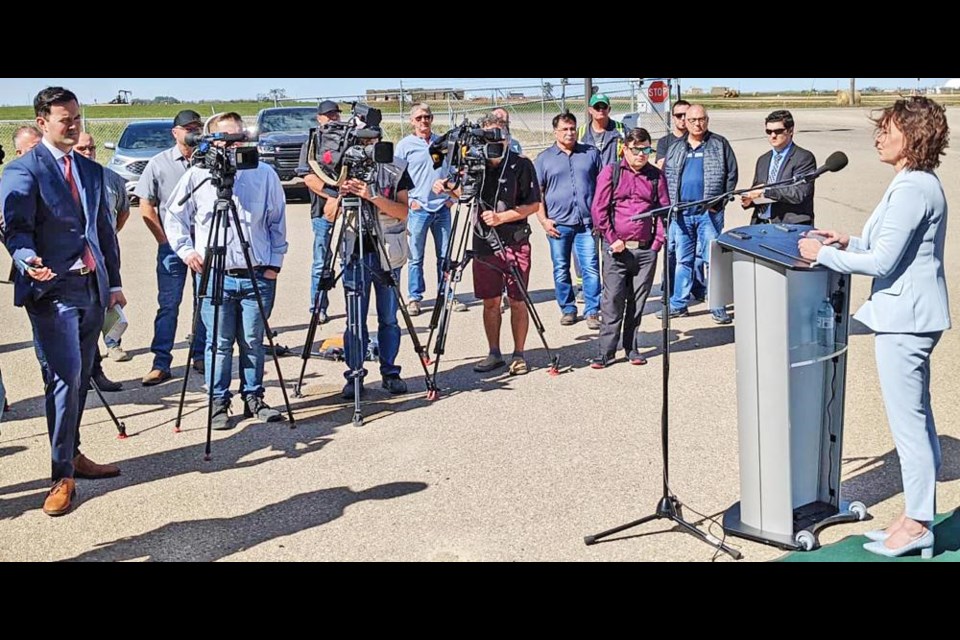WEYBURN - The provincial government’s key priorities to advance private sector investment in carbon capture utilization and storage (CCUS) was announced by Energy and Resources Minister Bronwyn Eyre on Tuesday, at one of the world’s largest enhanced oil recovery (EOR) projects, operated by Whitecap Resources near Weyburn. She said the province is seeking federal assistance in recognition of the carbon capture work being done here, as well as federal dollars for infrastructure projects to expand CCUS projects.
Accompanying her at the news conference were municipal councillors and representatives of Chambers of Commerce for Weyburn and Estevan, as well as Environment minister Warren Kaeding, Estevan MLA Lori Carr, and Grant Fagerheim, president and CEO of Whitecap Resources.
“We want to build on Saskatchewan’s energy strength and make our province the most competitive jurisdiction in Canada to invest in CCUS technology and infrastructure,” Eyre said. “Saskatchewan is already a world leader in carbon capture, particularly with enhanced oil recovery, which leading environmentalists agree countries can’t achieve Paris Accord Targets without. CO2 EOR also emits 82 per cent fewer emissions than traditional extraction methods.”
The Government of Saskatchewan anticipates that CCUS projects will attract provincial investment of more than $2 billion and sequester over two million tonnes of CO2 annually.
Fagerheim explained to reporters there are many opportunities for expansion of their project, but they are looking for some cooperation from the federal government in the form of investment tax credits for spending on capital projects.
“Sequestering more CO2 is just not feasible without the credits. We think there is much opportunity right within this facility and in this capture area. There are plenty of opportunities,” he said.
Of the carbon tax, he noted it will go from about $40 a tonne to $170 a tonne, with no offsetting credits for what his company is doing.
The CEO said he and many people learned lessons from their parents which are applicable to the carbon tax. “Penalizing people for better behaviour doesn’t work, but incentivizing people to better behaviour and lower carbon emissions, that does actually make a difference.”
Fagerheim noted Whitecap spends about $27 million a year for their supply of carbon dioxide, from the Synfuels plant in North Dakota and from the Boundary Dam-3 at Estevan, with about a third of the CO2 from the Boundary Dam.
“It’s higher priced CO2 than what we pay the Synfuels facility,” he said, adding they are looking at the possibility of expansion, as they have the capacity in the Weyburn field to sequester another 80 million tonnes of CO2. Fagerheim also pointed out that of the four million tonnes of CO2being sequestered in Canada every year, half of that is sequestered in the Weyburn Oil Field.
Over the last 25 years, Saskatchewan EOR projects have sequestered more than 40 million tonnes of CO2, which has also resulted in over 100 million barrels of incremental oil production.
Eyre said they also are looking to the federal government for help, particularly if they are serious about CCUS being a viable environmental technology for the sequestering of CO2.
“It was disappointing to us when the federal government excluded EOR from tax credits,” said Eyre.
She pointed out that in the United States, EOR projects are recognized for their environmental benefits. “We see an enormous boom around the whole menu of projects. Absolutely we’re hopeful that whoever is in on Sept. 20th, will take another look at the enhanced oil recovery (EOR) side of this,” she said.
In addition to seeking tax credits, she said, they are looking for federal assistance such as with Hub funding and capital retrofits, which would include CCUS projects in the southeast.
“They themselves acknowledge that we are world leaders in CCUS technology,” she added, pointing out this is a big buzzword in environmental circles.
Approximately 200 million barrels of production will be added over the life of these and other EOR projects, significantly increasing the life-cycle and sustainability of these wells. CCUS can also capture CO2 and use it as part of other industrial processes, including ‘green’ concrete and biofuels.



